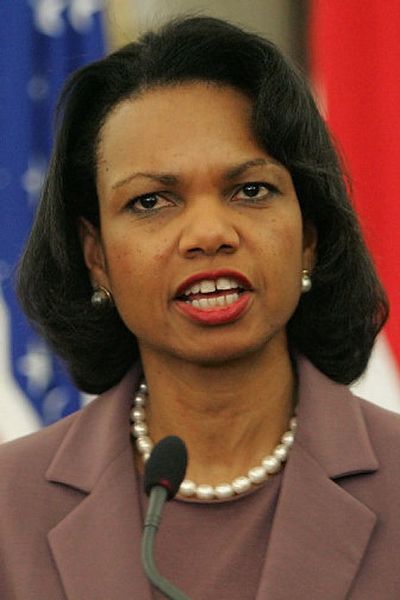White House downplays threat of civil war

WASHINGTON – With sectarian violence exploding across Iraq, Bush administration officials grappled for ways Thursday to calm the fury and play down the bloodshed as they confronted a crisis.
President Bush denounced the bombing of a Shiite shrine in Samarra as an “evil act” intended to create civil strife, and praised Iraqi leaders who have been urging calm.
Bush said Americans strongly condemned Thursday’s bombing of the Golden Mosque, and that he understood “the consternation and concern of Iraqi Shias when they see this most holy site wantonly destroyed.”
Bush said the United States will continue to work “with those voices of reason to enable Iraq to continue on the path to democracy” and pledged that the United States would help rebuild the shrine.
The second day of deadly violence brought wide warnings that Iraq could be sliding into a broader civil war, and some U.S. military officers privately acknowledged they were worried by the attacks. But in public statements, U.S. officials insisted that the eruption would not throw off the country’s progress and unveiled no new plans for U.S. action to counter the sudden deterioration of the country’s political and security outlook.
U.S. Secretary of State Condoleezza Rice, en route to Beirut, Lebanon, bluntly rejected a question on whether the country was descending into civil war.
“I don’t think we do the Iraqi people any good, or really that we are fair to them, in continually raising the specter that they might fall into civil war, when it seems that the only people who want a civil war in Iraq are the terrorists …,” Rice said.
She said Iraqis are trying to bridge sectarian violence that has been overcome in the past by “repression and violence, and they’re now trying to deal with them through a political process,” she said. “And there are people who want to try and stop that.”
U.S. Ambassador Zalmay Khalilzad was trying to reach out to local and national Iraqi political leaders to calm the situation, Rice said.
In Washington, Adam Ereli, the deputy State Department spokesman, said Iraq continued to move forward politically, despite a day in which developments seemed to endanger the U.S. goal of an ethnically and religiously unified government in Baghdad.
About the violence, Ereli said: “Let’s not blow this out of proportion.”
He insisted that “there has not been the kind of widespread unrest that many people feared” and praised the “vigorous response” of the Iraqi security forces. Instead of a potential government collapse, Ereli called the response to the aftermath of the shrine’s destruction “an affirmation that the approach we’ve been taking has worked.” He also minimized the potential significance of a Sunni pullout from talks to form a new government, saying the process was complicated.
“It’s not a straight line with the same amount of movement every single day,” he said. “It is a path with twists and turns. One should not conclude that because there is a pause one day, that the whole political process is collapsing.”
Some Iraqis complained that the U.S. forces had not done enough to prevent violence. But U.S. officials insisted that the U.S. forces were not needed in the lead role, and that putting them in that position would undermine the Iraqi government.